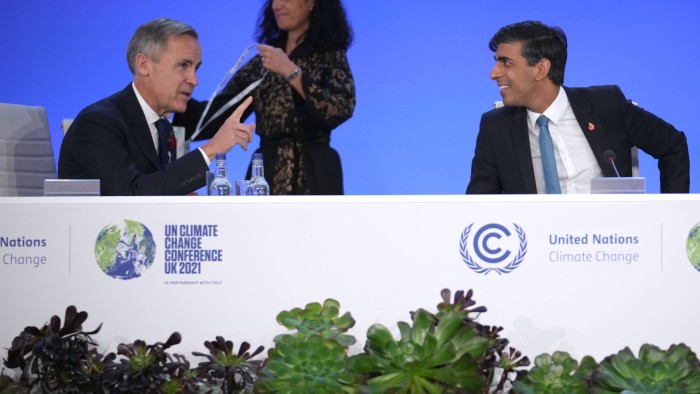Mark Carney’s green alliance rides out stormy waters

Roula Khalaf, Editor of the FT, selects her favourite stories in this weekly newsletter.
The 2021 initiative to organise financial institutions into an alliance to fight global warming has endured growing pains, as a prominent member has withdrawn and political attacks from powerful US Republicans have challenged its mission.
Launched at the time of the UN climate summit and co-chaired by former Bank of England governor Mark Carney, the Glasgow Financial Alliance for Net Zero (Gfanz) acts as a forum for financial institutions to co-ordinate efforts on cutting greenhouse gas emissions. It has specialist subgroups for asset managers, insurance companies and banks, among others.
“Gfanz brings together the most ambitious firms in every sector of finance, from every continent,” Carney said in 2021. Participating organisations would develop “detailed [emission] reduction plans, and will report all the emissions of their borrowers and investee companies annually,” Carney pledged.
Gfanz is also supported by its other high profile co-chair Michael Bloomberg, the billionaire owner of the eponymous financial information group, while Mary Schapiro, a former head of the Securities and Exchange Commission, serves as vice-chair.
Some of its member organisations are already aligning their portfolios with a commitment to limit global warming to ideally 1.5C, as set out in the Paris agreement, by putting in place net zero emissions policies for 2030 or sooner.
Despite all its promise and much fanfare at the Glasgow COP26 gathering, Gfanz hit trouble by the time of its first anniversary, as the alliance came under fire in the US from Republican state attorneys-general last year.
The Gfanz requirement that its members adopt net zero emissions pledges placed the institutions at risk of breaching US antitrust laws, the attorneys-general said last August.
After some financial services groups also complained about the risk of being accused of collusion by competition regulators, Gfanz dropped an explicit ban on the financing of new coal projects last year.
“The risk is that a co-ordinated divestment effort, on a specific timeline, could be seen as a form of collective boycott that is prohibited under US antitrust laws,” explains Cynthia Hanawalt, a senior fellow at Columbia Law School’s Sabin Center for Climate Change Law and previously chief of the investor protection bureau for the New York attorney-general.
However, the burden of proof needed to win an antitrust case against Gfanz members would be quite high, she adds. Hanawalt says she is not aware of any successful antitrust claims against a business for participating in a climate agreement.
In the UK, the Competition and Markets Authority has handled the issue by indicating in January that it would ease the antitrust rules on climate change initiatives, as long as they would result in a wider benefit.
Nearly six months after JPMorgan, Morgan Stanley and Bank of America threatened to leave Gfanz over these potential regulatory issues, the major US banks remain members of the organisation, according to its website.
Jane Fraser and Brian Moynihan, chief executives of Citigroup and BofA respectively, remain still listed as members of the Gfanz principals group, which helps the set strategic direction and priorities for the organisation.
However, there has been a high profile departure: Vanguard, the world’s second largest asset manager, quit the Gfanz net zero asset managers alliance in December. “We felt that our voice was being drowned out or confused,” Vanguard chief executive Tim Buckley told the Financial Times last week.
One additional institution has left the asset managers alliance since the Vanguard exit, Gfanz says. In that time, six additional groups had joined that alliance, it said, bringing the total to 301 asset managers.
Still, as Gfanz enters its third year of existence, it faces fresh challenges and continued scrutiny.
Members institutions are at risk of mistaking mere participation and target setting for real action and performance, says Aideen O’Dochartaigh, a professor at the Dublin City University business school.
Presenting sustainability initiatives as aspirational can change behaviour, but merely setting targets, “is no substitute for performance and, in the climate crisis, that means emissions reduction”, she says.
Gfanz members might ultimately prove they have cut emissions but, until then, the alliance’s value remains “largely symbolic, not substantive”, O’Dochartaigh says.
This leaves Gfanz is at an inflection point, says Tom Gosling, an executive fellow at the London Business School who advises company boards on environmental, social and governance policies.
Either the alliance contracts “into a group of true believers”, who stick with the best endeavours to pursue goals related to limiting global warming to 1.5C, or commitments are further adjusted, Gosling says.
“A growing number of people are acknowledging that retaining the headline 1.5C commitment risks creating a distraction from the important work Gfanz is doing,” he says.
By putting 1.5C so clearly on the label, Gfanz has left itself vulnerable to this dual criticism of political over-reach and greenwashing, Gosling adds.
“This will only get more difficult as the gap grows between the path the world is on and the path it needs to be on to hit 1.5C — which creates very obvious disconnects in financing activity right now.”
Climate Capital

Where climate change meets business, markets and politics. Explore the FT’s coverage here.
Are you curious about the FT’s environmental sustainability commitments? Find out more about our science-based targets here

Comments